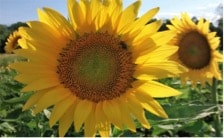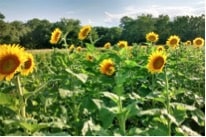If I could take my bees on an outing it would be to the McKee-Beshers Wildlife Management Area off River Road in Poolesville. Thirty acres of sunflowers have been planted just for the wildlife to enjoy. They will bloom early to mid-July. It is sight to see. The blooms all face the sun and are buzzing with bees of all types. In addition to being a plentiful food source for our honey bees, the sunflower pollen may provide defense chemicals that improves bee health.
Lynn Adler a biology professor at the University of Massachusetts Amherst recently received a 3-year $1 million-dollar grant to study the role that sunflower pollen may play in improving honey bee health. The grant is part of the USDA’s efforts to improve pollinator health with more creative strategies. Pilot studies suggest that sunflower pollen can help bumblebees fight off the common pathogen called Crithidia. Reducing the numbers of Crithidia in one bee, reduces the spore load in the feces of that bee which lowers the likely hood of spreading the parasite to other bees.
Crithidia are parasitic protozoa that are passed via feces and develop in the digestive tract of insects. Infected bees waste their energy and wing muscles visiting plants/flowers that don’t have nectar and slowly starve to death. Interestingly, commercially bred bees, like the ones used to pollinate tomatoes in greenhouses have the highest levels of the parasite. Wild bees typically do not have the parasite.
Adler has studied flower nectar for years and discovered that the defense substances of a plant are much more concentrated in the pollen than in the nectar. Plants produce defense substances (also called secondary metabolites) to ward off predators. To reproduce, a plant needs its pollen to be delivered unharmed, to the female parts of the flower. It makes sense that a plant would protect its pollen with a coating that contains substances that are unpleasant or harmful to predators and not harm the pollinators that successfully transport the plant’s pollen. What these defense substances do to the bees that collect and consume the pollen is not known. These defense substances may harm the gut parasites within the bee, rewarding the bees for their pollination services with better health. This is what Adler’s team aims to discover.
Adler’s study will use North Carolinas’ agricultural stations of different sunflower plantings to assess the effect of different sunflower plantings on wild bees. They will also investigate the effect of varying amounts and concentrations of pollen supplements. Local scientists are involved as well. Jay Evans of the USDA in Beltsville will contribute honey bee gut parasite and disease knowledge. Dennis van Engelsdorp, who spoke to our club last fall, will share information from the Bee Informed Partnership at the University of Maryland.
My bees cannot visit the sunflower fields of McKee-Beshers WMA but having them forage on the sunflowers that grow in the vegetable gardens of my neighborhood may give them an extra boost that helps them ward off disease and survive the winter.
For more information about the sunflower fields at McKee Beshers WMA visit their website.
Go to the American Bee Journal to read the full article.
-Pam Hepp


